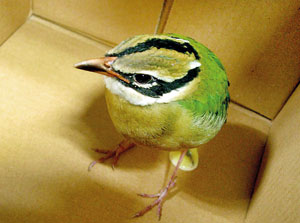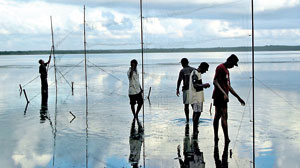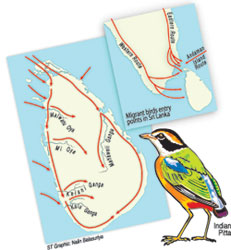| Sri Lanka is the destination of choice for a variety of migrant birds, and they usually stop over at the same sites every year.
This was proved by two feathered visitors – a Common Redshank and a Lesser Sand Plover – that were captured recently in the Bundala National Park, on the southern coast.A team of bird lovers working for the National Bird Ringing Programme noted that the two birds had been ringed during earlier visits to the national park: the Common Redshank was ringed in 2009, and the Lesser Sand Plover in 2007.
 |
| Exhausted Pitta found in Maradana in 2009 |
 |
| Setting up mist nests in Bundala at dusk |
Bird migration is a source of fascination to bird lovers. Year after year, during the visiting season, these overseas callers are drawn to Sri Lanka, because of the island’s geographical position, just below the southern tip of the Indian subcontinent. Sri Lanka represents their final destination in their long journey from their homes in northern climates.
The National Bird Ringing Programme, a scientific study of bird migration patterns, is a joint venture of the Field Ornithology Group of Sri Lanka and the Department of Wild Life Conservation. The programme was launched six years ago, in April 2005, at the Bundala National Park.
Migrant birds start arriving in Sri Lanka around the middle of August, ahead of the winter in their native lands. After spending around six months in the island, they return to their breeding grounds towards the end of April the following year. Of the 492 bird species recorded in Sri Lanka, 169 or 36 per cent are migrants. Waders, ducks and coastal birds represent the bulk of the visitors.
The Bundala wetland, about 15 kilometres east of Hambantota, is a paradise for migrants, and has been the base for the ringing programme.
Ringing is a delicate operation, and is generally conducted at dusk. Mist nets (nets with small holes eyes) are strung up around the Bundala lagoon. Birds that get entangled in the nets are taken to the camp and their statistics recorded. A small, individually numbered ring is attached to the birds’ legs.
The ringing exercise takes place four times a year, three during the migratory season and one in July. The three migratory season operations are conducted at the start of the wintering period (September to October); in mid-winter (December to January), and the end of the wintering period (March to April).
Researchers say the ringing programme should be expanded to other locations in the country in order to allow a better understanding of the migrants.
Habitat loss is a serious threat to migrants, says ornithologist, Professor Sarath W. K. Kotagama. The migrants are highly vulnerable to disruption of habitat, such as the cutting down of swathes of forest. These disruptions may threaten the very survival of the bird species, he says.
Watch out for migrants in trouble
Anyone who cares about birds and wildlife would be interested to know that you do not have to go all the way to the south coast, to places like the Bundala Nature Reserve, to see migrant birds.
Some of the more common migrants visit home gardens as their temporary residence, and even hover around populated urban areas, including the city of Colombo. These visitors include the Indian Pitta (Avichchiya); the Asian Paradise Flycatcher (Sudu-Redi Hora); the Blue-tailed Bee-eater; the Brown Flycatcher, the Barn Swallow, and the Forest Wagtail.
The Field Ornithology Group of Sri Lanka, an affiliate of BirdLife International, organizes “MigrantWATCH”, an opportunity for bird lovers to observe and study migratory birds.
Some of the common migrants need our help in order to survive. The Indian Pitta, for example, arrives in Sri Lanka, usually exhausted after its long journey. Protect the bird if you see it in your garden.
The Sunday Times reported one such Indian Pitta that was rescued in Nugegoda. and another that was rescued in Colombo. Alert residents can help the tired bird by rescuing the troubled Indian Pittas found in their gardens. “This is one of the reasons we started MigrantWATCH,” says a member of the Ornithological Society.
If you spot a troubled migrant bird, or would like to participate in the MigrantWATCH programme, call the Field Ornithology Group (011) 2501332 / 0776248302, or write to fogsl@slt.lk.
Upcoming Migrant WATCH activities:
n Lecture on “Migration and Bundala Birds” by Prof. Sarath Kotagama on Saturday, October 29, at 9.30 am, at the Science Faculty of the University of Colombo (entrance on Thurstan Road);
n Field visit and workshop to Bundala to study migrants and wader birds: 10 to 13 November
n Field visit to Mannar : 8 to 11 December
n Field visits to Thalangama and other wetlands to see migrants (call (011) 2501332 / 0776248302 for details). |




